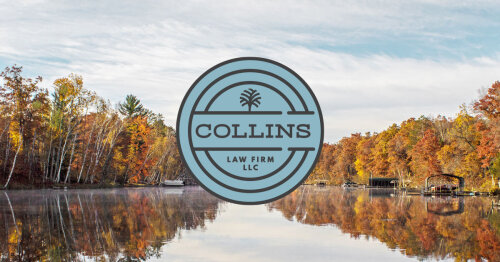Best Legal Document Lawyers in Wisconsin
Share your needs with us, get contacted by law firms.
Free. Takes 2 min.
Or refine your search by selecting a city:
List of the best lawyers in Wisconsin, United States
United States Legal Document Legal Questions answered by Lawyers
Browse our 2 legal questions about Legal Document in United States and read the lawyer answers, or ask your own questions for free.
- Confirming the authenticity of a divorce decree
- I'm married to a Nigerian, and I believe he provided a fake divorce decree, I need help to confirm this decree.
-
Lawyer answer by Nomos Legal Practice
Thank you and best regards, Kingsley Izimah, Esq. SK Solicitors
Read full answer - How do I legally protect my idea before selling or licensing it to a company?
- I have a makeup product idea that I want to sell or license, not the product itself. It is influenced by a product that was recently launched. Therefore, I want to sell/license to the company that launched said product. After some research, I contacted a patent attorney who explained that... Read more →
-
Lawyer answer by P.O OHIKHENA & Co
Good day,A patent will not be applicable since it's still an idea. You can go into an MOU(Memorandum of understanding) with the said company and also an NDA.You can contact me for my insight. Visit our profile and send us...
Read full answer
About Legal Document Law in Wisconsin, United States
Legal document law in Wisconsin refers to the rules, regulations, and procedures governing the creation, execution, verification, and filing of legal documents within the state. Legal documents include wills, contracts, powers of attorney, deeds, divorce papers, business agreements, and other formal records that have legal significance. Wisconsin law outlines specific requirements for the validity and enforceability of these documents, ensuring they protect the rights of the parties involved and comply with state standards.
Why You May Need a Lawyer
There are many situations where a person might need legal assistance related to legal documents. Common scenarios include:
- Drafting or reviewing contracts to ensure fair terms and legal compliance
- Preparing wills, trusts, and other estate planning documents
- Filing for divorce or other family law matters involving court forms
- Buying or selling real estate, which requires proper documentation
- Executing a power of attorney or advance healthcare directive
- Forming or dissolving a business and drafting related agreements
- Issues of document authentication or notarization
- Defending or initiating a lawsuit, which requires carefully prepared pleadings
- Correcting or challenging existing legal documents
- Ensuring documents comply with special requirements for minors or disabled persons
In these and other situations, having a knowledgeable lawyer can help prevent errors, avoid legal disputes, and ensure your interests are properly represented.
Local Laws Overview
Wisconsin state law sets out numerous requirements and procedures for legal documents. Several statutes, as well as local court rules, may apply depending on document type:
- Signatures and Notarization: Many legal documents must be signed in front of a notary public to be valid. Wisconsin has specific rules about when notarization is required.
- Witness Requirement: Some documents, such as wills, require two disinterested witnesses under state law.
- Real Estate Documents: Deeds, mortgages, and leases may need to be filed with the county register of deeds and comply with formatting standards.
- Electronic Documents: Wisconsin recognizes most electronic signatures and records as valid, following the Uniform Electronic Transactions Act and local adaptations.
- Court Filings: Civil and family court documents must be completed on approved forms and filed with the correct court, subject to local protocols.
- Power of Attorney: Wisconsin provides a standard power of attorney form, which has statutory requirements that must be met to be effective.
- Public Records: Many legal documents become public record upon filing, while others remain confidential, such as juvenile or adoption records.
- Translation Requirements: Documents in languages other than English may need certified translation for court or filing purposes.
Local laws in Wisconsin are designed to protect parties from fraud and to ensure the authenticity, legality, and enforceability of legal documents.
Frequently Asked Questions
What types of legal documents commonly require notarization in Wisconsin?
Documents such as wills, real estate deeds, affidavits, certain powers of attorney, and court sworn statements often require notarization to be considered valid in Wisconsin.
Can I use electronic signatures on legal documents in Wisconsin?
Yes, most types of legal documents can be signed electronically in Wisconsin. However, certain documents, such as wills or recorded deeds, may have exceptions and require traditional signatures.
Where do I file real estate documents in Wisconsin?
Real estate documents typically must be filed with the Register of Deeds in the county where the property is located. The document must meet formatting and notarization requirements before filing.
Do all contracts have to be in writing under Wisconsin law?
Not all contracts must be in writing, but certain agreements, such as those involving real estate or long-term commitments, must be in writing to be enforceable under the Wisconsin Statute of Frauds.
What makes a will valid in Wisconsin?
To be valid, a will in Wisconsin must be in writing, signed by the testator (the person making the will) or at their direction, and witnessed by at least two disinterested individuals. Notarization is not required but can help with self-proving affidavits.
How do I revoke or change a legal document I already signed?
Revoking or changing a legal document typically requires you to create a new document that explicitly revokes the prior one, or you may need to follow certain statutory procedures, depending on document type.
Are there free or low-cost resources for legal document preparation in Wisconsin?
Some free or low-cost services are available, such as forms and guidance through county courts, the State Bar of Wisconsin, and some legal aid organizations.
What happens if a legal document is not properly executed in Wisconsin?
If a document fails to meet legal requirements, it can be declared invalid or unenforceable. This could result in loss of rights, delays in legal proceedings, or other complications.
Do I need a lawyer to draft a legal document, or can I do it myself?
While you can draft some documents on your own, consulting an attorney is recommended, especially for complex or high-stakes matters, to ensure your interests are protected and the document is valid under Wisconsin law.
Can out-of-state legal documents be used in Wisconsin?
Out-of-state legal documents may be recognized in Wisconsin if they meet state requirements and do not conflict with local laws. However, it may be necessary to have the document reviewed or re-executed by a Wisconsin attorney.
Additional Resources
If you need more information or assistance regarding legal documents in Wisconsin, consider these resources:
- Wisconsin State Law Library - provides access to laws, sample forms, and research support
- State Bar of Wisconsin Lawyer Referral and Information Service
- Legal Action of Wisconsin and Wisconsin Judicare - offer legal aid for qualifying individuals
- Wisconsin Department of Financial Institutions - business and notary public information
- County Courthouse Clerks - for local forms, filings, and court procedures
- Register of Deeds in your county - for real estate document recording
Next Steps
If you believe you need legal assistance with a legal document in Wisconsin, follow these steps:
- Identify the type of legal document you need help with and gather all related information.
- Contact a Wisconsin-licensed attorney who specializes in the relevant area of law, such as estate planning, real estate, business law, or family law.
- Use available local resources to obtain general forms or information if your situation is straightforward, but still have any documents reviewed by a lawyer before signing.
- Arrange for proper witnessing and notarization, as required by Wisconsin law.
- File or register your document with the appropriate office or court if necessary.
- If cost is a concern, seek out legal aid organizations or look for attorneys offering free consultations.
Getting professional help ensures your legal documents are valid and protect your interests. Acting promptly and following proper procedures can prevent common mistakes and legal headaches down the road.
Lawzana helps you find the best lawyers and law firms in Wisconsin through a curated and pre-screened list of qualified legal professionals. Our platform offers rankings and detailed profiles of attorneys and law firms, allowing you to compare based on practice areas, including Legal Document, experience, and client feedback.
Each profile includes a description of the firm's areas of practice, client reviews, team members and partners, year of establishment, spoken languages, office locations, contact information, social media presence, and any published articles or resources. Most firms on our platform speak English and are experienced in both local and international legal matters.
Get a quote from top-rated law firms in Wisconsin, United States — quickly, securely, and without unnecessary hassle.
Disclaimer:
The information provided on this page is for general informational purposes only and does not constitute legal advice. While we strive to ensure the accuracy and relevance of the content, legal information may change over time, and interpretations of the law can vary. You should always consult with a qualified legal professional for advice specific to your situation.
We disclaim all liability for actions taken or not taken based on the content of this page. If you believe any information is incorrect or outdated, please contact us, and we will review and update it where appropriate.
Browse legal document law firms by city in Wisconsin
Refine your search by selecting a city.










